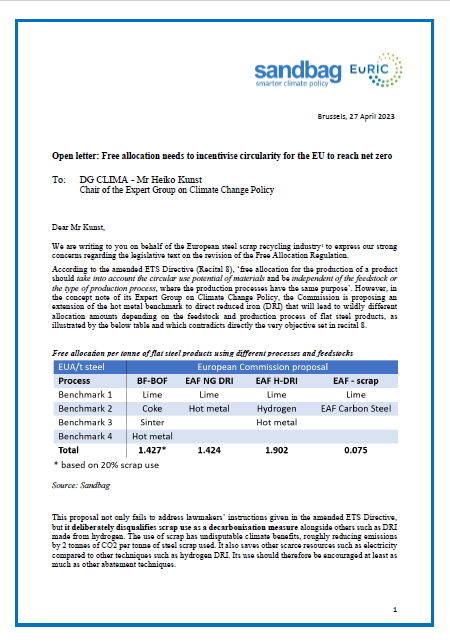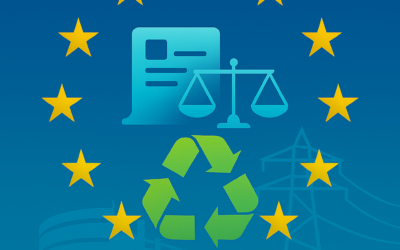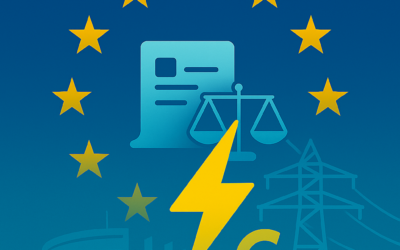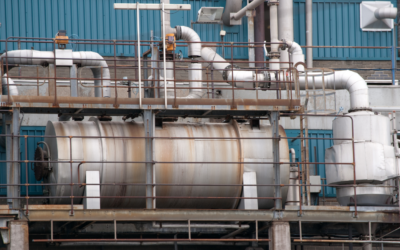Free allocation needs to incentivise circularity for the EU to reach net zero
To: DG CLIMA – Mr Heiko Kunst
Chair of the Expert Group on Climate Change Policy
Dear Mr Kunst,
We are writing to you on behalf of the European steel scrap recycling industry to express our strong concerns regarding the legislative text on the revision of the Free Allocation Regulation.
According to the amended ETS Directive (Recital 8), ‘free allocation for the production of a product should take into account the circular use potential of materials and be independent of the feedstock or the type of production process, where the production processes have the same purpose’. However, in the concept note of its Expert
Benchmarks Comparison
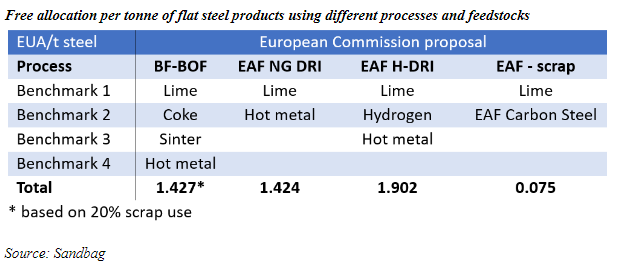
This proposal not only fails to address lawmakers’ instructions given in the amended ETS Directive, but it deliberately disqualifies scrap use as a decarbonisation measure alongside others such as DRI made from hydrogen. The use of scrap has undisputable climate benefits, roughly reducing emissions by 2 tonnes of CO2 per tonne of steel scrap used. It also saves other scarce resources such as electricity compared to other techniques such as hydrogen DRI. Its use should therefore be encouraged at least as much as other abatement techniques.
Instead of awarding free allowances based on an intermediate material such as hot metal, regulation should award them based on the flat steel or long steel product output, as proposed by Sandbag in its note submitted to the Expert Group. Doing so could avoid the emission of 160 million tonnes of CO2 by 2030.
The EU currently fails to incentivise the use of steel scrap in steelmaking despite this being the most efficient manner to both transition towards a circular and climate-neutral economy. Sandbag’s proposal, supported by the European recycling industry, would contribute to creating a vibrant scrap market and provide incentives that are much required to reward environmental benefits arising from steel recycling. The increased use of scrap in flat steel production often requires costly investments, which no incentives currently address. Reforming free allocations in the way proposed would help finance this transition.
We think that the upcoming reform of the Free Allocation Regulation has the capacity to speed up decarbonisation, but only if the right incentives are set. Differentiated benchmarks for the same type of goods disincentivise transition to cleaner processes, as the more polluting processes receive more permits. This risks perpetuating polluting production processes and wasting much needed resources.
In order to reduce emissions and minimise material use, but also from the perspective of eliminating dependencies on systemic rivals, circularity is crucial on the EU’s path to net zero. Making free allocation dependent on products rather than processes would make full use of the potential of benchmarks to speed up industrial decarbonisation.
We hope that you will carefully consider these points in advance of publishing the Delegated Acts. We remain at your disposal for further information or any questions.
Yours sincerely,
Signatories

Emmanuel KATRAKIS Adrien ASSOUS
Secretary General of EuRIC Executive Director of Sandbag Climate Campaign
About EuRIC
The European Recycling Industries’ Confederation (EuRIC) represents the recycling industry at a European level. Gathering the vast majority of national recycling federations from EU/EEA Member States, the Confederation represents about 5,500+ recycling companies – from market leaders to SMEs – generating an aggregated annual turnover of about 95 billion € by treating various waste streams such as household or industrial & commercial waste including ferrous and non-ferrous metals, end-of-life vehicles (ELVs), electronic waste (WEEE), packaging (paper and plastics), end-of-life tyres or textiles.
About Sandbag
Sandbag is a non-profit climate change think tank which uses data analysis to build evidence-based climate policy. We focus on EU policies such as the EU Emissions Trading Scheme and climate governance, and emissions reductions in industrial sectors. We believe in Europe’s ability to lead climate action by example, using its large market and technological momentum as an incentive for others to follow. But we are also aware of the risk that Europe might fail to deliver on its own pledges, which is why we want to get EU climate policy right.
Read More:
Sandbag’s feedback to the call for evidence on the Circular Economy Act
Sandbag welcomes the Circular Economy Act (CEA) as an important step to accelerate the transition to a circular economy in the EU. Progress in this area has been slow and this act is sorely needed to address systemic issues holding back circularity, including the current fragmented approaches across Member States.
Electrification or electrical decarbonisation? We need both!
We agree with the European Commission’s general diagnosis that increasing the share of electricity in overall energy consumption is necessary to achieve deep decarbonisation. However, it is not sufficient. If overall energy use increases, or if electricity generation does not decarbonise rapidly, then electrification may fail its decarbonisation role.
Heat up industry, not the climate!
The European Commission has set out proposed terms and conditions for its auction on electrified /renewable industrial heat under the Innovation Fund (IF). We support the IF’s acknowledgment that indirect emissions are linked to the timing of electricity consumption rather than the source of electricity used. However, although it claims an intention to limit electricity use at hours of high marginal emission intensity, we are concerned that the proposed terms might lead to the opposite and significantly limit the scheme’s climate benefits.

